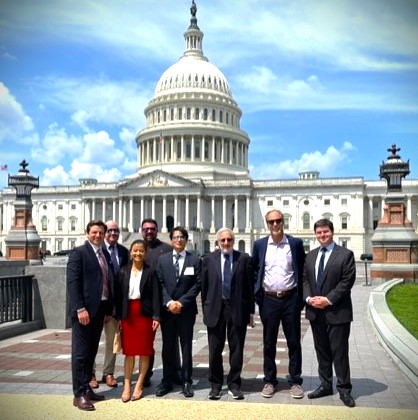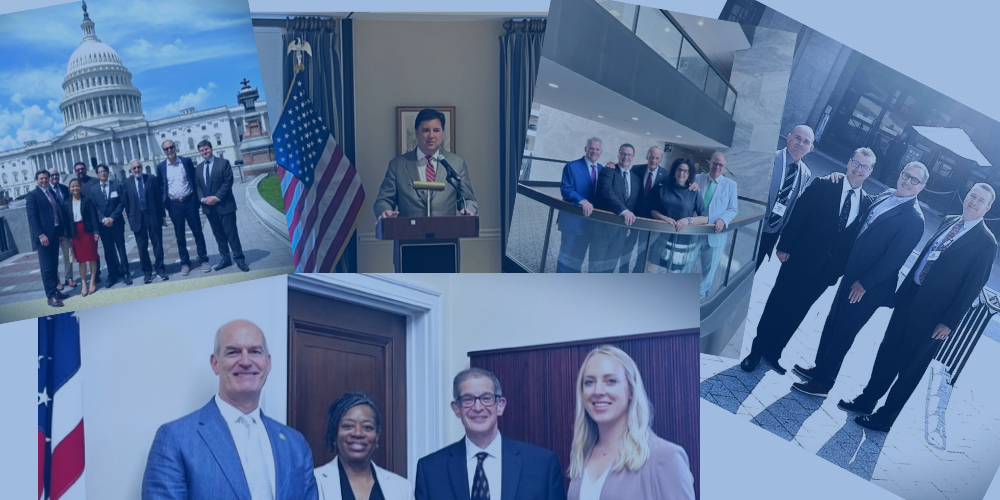Thank you to all who participated in the Washington, D.C. Fly-in! During the Summer Meeting, over 130 ISRI members and staff went to Capitol Hill to represent the recycled materials industry before Congress. The face-to-face conversations with lawmakers on our priority issues play a critical role in the present and future of our industry.
“This is the first Fly-in back in person and it went very well. Our members were pleased with the reception from lawmakers and the quality of the meetings they attended. We got to 110 offices, and we got our messages across,” said Billy Johnson, ISRI’s chief lobbyist.

During a 5-hour period, Fly-in participants held 110 meetings split almost equally between the Senate and the House. ISRI members discussed crucial issues with their members of Congress including recycling being redesignated as an essential industry, PFAS/PFOS and battery recycling.
“Our members were very good about expressing the need for the recycled materials industry to be reinstated as essential, why it was so important to them and how it kept them in business and operating during COVID — most of them would have been shut down through all the restrictions,” said Johnson.

Polyfluoroalkyl substances (PFAS)/perfluorooctane sulfonic acid (PFOS) substances — so called “forever chemicals” — were a lively issue that was discussed, specifically passive receiver liability for recyclers. Legislation concerning PFAS/PFOS affects all commodities and a very important issue since recyclers do not choose to receive PFAS/PFOS, but they’re found in everyday products that have been in the recycling stream for the past 50-60 years.
ISRI members also urged their senators and representatives to support passage of both the Recycling and Composting Accountability Act (RCAA) and the Recycling Infrastructure and Investment Act (RIAA). Both bills properly define what is– and is not– recycling. Their focus is on improving residential recycling programs, but the definitions will impact all segments of the industry — including industrial and commercial. Defining what exactly “recycling” is- and is not- is critical, especially as policymakers at all levels of government are increasingly looking to create legal frameworks that encourage the circular economy and sustainability.

Batteries were another big topic for most ISRI members. As bipartisan support for the U.S. to transition to a decarbonized economy grows, the recycled materials industry has an integral role in providing the high-quality materials to the manufacturing sector to help achieve this goal. ISRI members, by meeting with their members of Congress, laid the foundation to make sure the recycled materials industry is part of policy discussions and decisions related to meeting national commitments to transition to a decarbonized economy by maintaining a safe and stable manufacturing supply chain.
“ISRI members get to really tell the story and members of Congress really want to hear it from the source. It builds credibility for ISRI and ISRI lobbyists on Capitol Hill,” stated Johnson.
The Fly-in meetings have already started to bear fruit:
- Bipartisan letters supporting the recycled materials industry as essential businesses are now being sent to the Department of Homeland Security from both the House and Senate.
- This Wednesday, July 26, there will be a Senate Environment and Public Works Committee hearing on electronics and batteries, where half of the panel testifying will be ISRI members. This will be a great opportunity to reinforce ISRI Fly-in messages on how electrification is going to impact the recycled materials industry, which is at the core of the country’s sustainable supply chain.
“It was a team effort across ISRI. Over half of ISRI staff took our members up to the Hill; that’s why it was so successful, why it ran so smoothly,” added Johnson.











